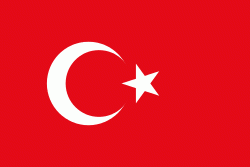Balçova
Balçova (pronounced Balchova), is a district of Izmir Province in Turkey. It is one of the eleven districts in the Greater Metropolitan Area of Izmir, the smallest in terms of area. Balçova is a fully urbanized at the rate of 100,0 per cent and the center has no depending townships with own municipalities or villages. Balçova district area follows the southern coastline of the inner Gulf of Izmir, on the road to Çeşme and is at a distance of 8 km to the west from the traditional center of Izmir (Konak), which it borders on the east. Balçova district further neighbors the district area Narlıdere to the south and the west, both of its neighbors being among Izmir's metropolitan districts. Balçova district's overall levels of education are among the highest in Turkey, the literacy rate reaching 98 per cent, while the calculations for average yearly income per inhabitant situate it slightly below the national average, at 4.327 US Dollars, for which its open approach to outside immigration may have played a role. The overall appearance of Balçova leaves the impression of a locality where people are generally educated and who subsist on mid-revenues. The economy is largely based on commerce and tourism, its three shopping malls constituting the backbone for the first range of activities, and its thermal baths for the second. New housing projects putting Balçova's advantageous location to benefit and generally aimed at mid- to higher- income residents started to be built in recent years and as such, Balçova became in recent years one of Izmir's metropolitan districts where the economy grew the fastest. Balçova is home to Izmir University of Economics.
The baths are well-known since antiquity and the name ancient, and makes reference to a contingent of Greeks under Agamemnon during the Trojan War who were led by an oracle to the warm springs to heal their wounds after a battle. Aelius Aristides had also frequently resorted in the baths and had reported that it was here that Asclepius had first began to prophesy.
A number of sulfurous hot springs rise in and around a small stream, which previously dried up in summer, but which is now kept in service all year round thanks to modern installations centered around a five-star hotel. The waters, of a temperature of to 160 degrees Fahrenheit, are considered good for rheumatism, sciatica, gallstones and eczema. The baths are remain extremely popular both by themselves and by the thermal establishment's having extended its range of activities also in the field of congress and exhibition tourism.
The baths are well-known since antiquity and the name ancient, and makes reference to a contingent of Greeks under Agamemnon during the Trojan War who were led by an oracle to the warm springs to heal their wounds after a battle. Aelius Aristides had also frequently resorted in the baths and had reported that it was here that Asclepius had first began to prophesy.
A number of sulfurous hot springs rise in and around a small stream, which previously dried up in summer, but which is now kept in service all year round thanks to modern installations centered around a five-star hotel. The waters, of a temperature of to 160 degrees Fahrenheit, are considered good for rheumatism, sciatica, gallstones and eczema. The baths are remain extremely popular both by themselves and by the thermal establishment's having extended its range of activities also in the field of congress and exhibition tourism.
Map - Balçova
Map
Country - Turkey
 |
|
| Flag of Turkey | |
One of the world's earliest permanently settled regions, present-day Turkey was home to important Neolithic sites like Göbekli Tepe, and was inhabited by ancient civilisations including the Hattians, Hittites, Anatolian peoples, Mycenaean Greeks, Persians and others. Following the conquests of Alexander the Great which started the Hellenistic period, most of the ancient regions in modern Turkey were culturally Hellenised, which continued during the Byzantine era. The Seljuk Turks began migrating in the 11th century, and the Sultanate of Rum ruled Anatolia until the Mongol invasion in 1243, when it disintegrated into small Turkish principalities. Beginning in the late 13th century, the Ottomans united the principalities and conquered the Balkans, and the Turkification of Anatolia increased during the Ottoman period. After Mehmed II conquered Constantinople (Istanbul) in 1453, Ottoman expansion continued under Selim I. During the reign of Suleiman the Magnificent, the Ottoman Empire became a global power. From the late 18th century onwards, the empire's power declined with a gradual loss of territories. Mahmud II started a period of modernisation in the early 19th century. The Young Turk Revolution of 1908 restricted the authority of the Sultan and restored the Ottoman Parliament after a 30-year suspension, ushering the empire into a multi-party period. The 1913 coup d'état put the country under the control of the Three Pashas, who facilitated the Empire's entry into World War I as part of the Central Powers in 1914. During the war, the Ottoman government committed genocides against its Armenian, Greek and Assyrian subjects. After its defeat in the war, the Ottoman Empire was partitioned.
Currency / Language
| ISO | Currency | Symbol | Significant figures |
|---|---|---|---|
| TRY | Turkish lira | ₺ | 2 |
| ISO | Language |
|---|---|
| AV | Avar language |
| AZ | Azerbaijani language |
| KU | Kurdish language |
| TR | Turkish language |















